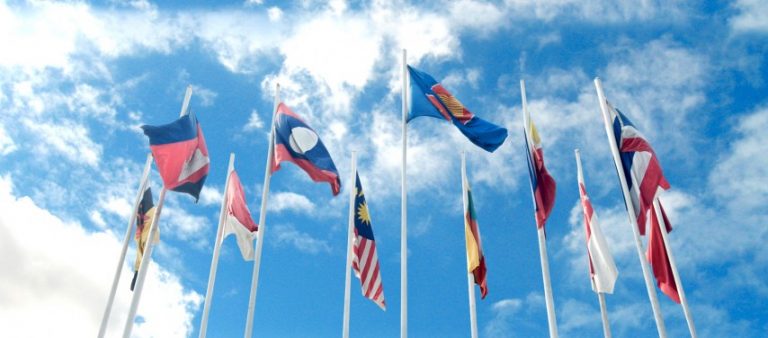“Strengthening ASEAN + 3 Cooperation”
- The ASEAN+3 Summit was held successfully on 29 November 2004 in Vientiane. The Meeting was chaired by H.E. Mr. Bounnhang Vorachith, Prime Minister of the Lao People’s Democratic Republic (Lao PDR), and was attended by Heads of State/Government of ASEAN, China, Japan and the Republic of Korea. It was the first time that the Lao PDR was privileged of hosting and chairing this important Summit.
- We welcomed President of Indonesia, H.E. Dr. Susilo Bambang Yudhoyono; Prime Minister of Malaysia, H.E. Dato’ Abdullah Bin Haji Ahmad Badawi; Prime Minister of the Union of Myanmar, H.E. Mr. Lieutenant General Soe Win, and Prime Minister of Singapore, H.E. Mr. Lee Hsien Loong who participated in the ASEAN+3 Summit for the first time. We also welcomed and congratulated H.E. Gloria Macapagal-Arroyo on her re-election as President of the Philippines.
- We exchanged views on regional and international political and security, and economic issues. We also discussed ways and mechanisms to strengthen the ASEAN+3 cooperation and its future direction. The ASEAN+3 Leaders shared their concerns on the challenges facing the region and the world such as terrorism, recent developments in Iraq, Middle East, and current situation in the Korean Peninsular, as well as the avian flu outbreak and other challenges to socio-economic development such as poverty, development gap, etc. We reiterated our determination to further make concerted efforts to fight terrorism in East Asia and our commitment to support global efforts to combat international terrorism.
- We reaffirmed our commitment to a peaceful and comprehensive solution to the nuclear issue on the Korean Peninsular and the necessity to engage into dialogue to promote mutual confidence and common approach. In this connection, we noted with encouragement the achievement by the three rounds of the Six-Party Talks, and we shared the view that the Six-Party Talks should be reconvened at the earliest possibility to bring about the common goal of denuclearisation of the Korean Peninsular.
- We welcomed the accession of the Republic of Korea and the Russian Federation to the Treaty of Amity and Cooperation in Southeast Asia, and encouraged other non-Southeast Asian countries to accede to the Treaty. We shared the view that efforts should be pursued to enhance the role of the Treaty as a code of conduct for the inter-state relations in the region.
- Taking into account the current high oil price, we supported energy cooperation, in particular, in alternative energy, such as bio-fuels, and hydroelectric power. We welcomed the outcomes of the 1st ASEAN+3 Energy Ministers Meeting in the Philippines in June 2004.
- We noted with satisfaction the steady progress in ASEAN+3 cooperation and encouraged a speedy implementation of the short and long term measures of the East Asia Study Group (EASG), which we adopted in 2002, aiming to broadening and deepening East Asia cooperation. We also noted the expanding and deepening of ASEAN+3 sectoral cooperation, especially in the monetary and financial and economic sectors. In this regard, we welcomed the setting up of the ASEAN+3 Unit in the ASEAN Secretariat last year. We expressed the need to strengthen the ASEAN+3 Unit in coordination and implementation of the cooperation and welcomed the Plus Three countries assistance to the Unit.
- We recognised the need to develop the Asian Bond Market, and to combat emerging diseases through new mechanisms, such as the establishment of “Outbreak Response Teams”.
- We exchanged views on the establishment of an East Asia Free Trade Area (EAFTA) and welcomed the decision by the ASEAN+3 Economic Ministers to set up an expert group to conduct a feasibility study on EAFTA.
- The Leaders of the Plus Three countries supported ASEAN Leaders’ decision to convene the first East Asia Summit (EAS) in Malaysia in 2005. The ASEAN+3 Leaders supported Japan’s proposal to host an ASEAN+3 Foreign Ministers Meeting in Kyoto in May 2005 to discuss the concept and modalities of an EAS.
- We agreed that the establishment of an East Asian Community is a long-term objective. We reaffirmed the role of ASEAN+3 process as the main vehicle for the eventual establishment of an East Asian Community. China, Japan, and the Republic of Korea reiterated their support for ASEAN’s role as the major driving force in East Asia cooperation. In addition, to mark the 10th Anniversary of the ASEAN+3 cooperation in 2007, we agreed to consider the idea of issuing the 2nd Joint Statement on East Asia cooperation as well as a work plan to consolidate the existing and future cooperation.
- The Leaders of China, Japan and the Republic of Korea welcomed the adoption of the Vientiane Action Programme (VAP) and expressed their support to ASEAN in implementing activities and projects in support of the VAP. They agreed to strengthen their efforts in assisting ASEAN to narrow the development gaps within ASEAN, and between ASEAN and the Plus Three countries.
- The Leaders of China, Japan and the Republic of Korea also welcomed the CLMV and the CLV Summits and expressed their support to the implementation of the Vientiane Declaration on Enhancing Economic Cooperation and Integration among Cambodia, Laos, Myanmar and Viet Nam; and the Vientiane Declaration on the Establishment of the Cambodia-Laos-Viet Nam Development Triangle.
- The ASEAN Leaders acknowledged with appreciation China, Japan, and the Republic of Korea for their assistance in implementing projects under the IAI Work Plan. They also expressed appreciation to China, Japan and the Republic of Korea for their support to Cambodia, Laos and Myanmar to participate in the Asia-Europe Meeting.
